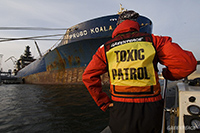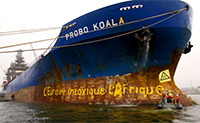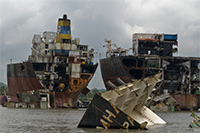NGOs call on Bangladesh: Stop Death Ship Before it Kills Again
Infamous Probo Koala Sent for Dismantling
NGO Shipbreaking Platform Media Release
 |
 |
 |
 |
| |
 |
|
| |
Photograph: Greenpeace |
|
 |
 |
 |
| |
 |
|
| |
Photograph: Aslund/Greenpeace |
|
 |
 |
 |
| |
 |
|
| |
Bangladesh beaches are no safe place to break ships
Photograph: Maro Kouri |
|
 |
 |
 |
|
| |
24 May 2011 (Brussels) – The Probo Koala, now re-named the Gulf Jash, a ship which caused an environmental and human rights disaster in the Ivory Coast in August 2006, has been sold for scrapping on the infamous ship breaking beaches of Chittagong in Bangladesh. Environmental, human rights and labour rights organisations represented by the NGO Shipbreaking Platform fear that the Probo Koala will be allowed to perpetuate its deadly legacy by being broken down in unsafe and environmentally damaging conditions. The Platform is calling on the government of Bangladesh to refuse the import of the ship. It is expected that the Probo Koala contains many tonnes of hazardous asbestos, PCBs, toxic paints, fuel and chemical residues. Currently the ship is located in Vietnam.
In 2006, the transnational company Trafigura used the Probo Koala to illegally dump 528 tonnes of toxic waste in Abidjan, the largest city of the Ivory Coast, causing the death of 16 people according to the Ivorian authorities [1]. Global Marketing Systems (GMS), a US company specialised in the brokering of vessels for demolition, confirmed it had bought the ship last week, but had so far not disclosed its final destination [2]. However its website currently lists that one of the advantages of utilising Bangladesh as a destination for end-of-life tankers is the lack of requirements for testing for gas residues within the ship [3]. These gases might ignite and explode when a shipbreaking worker uses a cutting torch.
“The Probo Koala already is a symbol of an unaccountable and irresponsible shipping industry,” said Bangladeshi lawyer and director of Bangladesh Environmental Lawyers Association (BELA), Rizwana Hasan. “We demand that this ship and all others like her, carrying toxic substances and intent on exploiting yet again the population and environment in the developing world, be barred from entry into Bangladesh.”
Shipbreaking as is done on the beaches of South Asia is one of the world’s most dangerous and polluting enterprises [4]. The NGO Shipbreaking Platform has, through its member organisation BELA, successfully petitioned in the Bangladeshi courts to stop the import of toxic ships for breaking, and safer methods of breaking ships already exist today. However, due to intense political and economic pressure from the shipbreaking and shipping industry, the court ruling has temporarily been lifted pending further decisions. Unless and until the High Court decision is allowed to stand, toxic ships will continue to pile up on the beaches of Bangladesh where they are broken apart by hand exposing workers to explosions and occupational disease, while contaminating the coastal environment.
“A ship that was used to generate, and then dump toxic waste in a developing country is now aiming to do the same all in the name of ship recycling,” said Ingvild Jenssen, Director of the Platform. “While victims of the dumping of toxic waste in the Ivory Coast are still awaiting effective justice and fair reparation for their harm, we must stop this ship before it causes more casualties.”
If the Bangladeshi authorities do not stop the vessel from entering its territorial waters, the NGOs fear that the ship will be allowed to perpetuate its deadly legacy by being broken down in unsafe and environmentally damaging conditions. According to the Platform, toxic ships should be dismantled in green recycling facilities where workers and the environment are protected from exposure to toxic waste.
NOTES
[1] The Probo Koala was used by oil trader Trafigura to reduce the high mercaptan sulphur levels in low-grade coker naphtha with caustic soda. As land facilities no longer allowed this controversial process – caustic washing – Trafigura decided to carry out these dangerous operations onboard vessels in the Mediterranean Sea. Trafigura attempted to get rid of the toxic residues of these operations present in the slop tanks of the Probo Koala in Amsterdam, but Trafigura refused to pay the high price for proper processing and chose instead to bring the toxic load to Africa. After having been turned down in Nigeria, Trafigura contracted a local company in the Ivory Coast, to get rid of the waste very cheaply in Abidjan - the country’s largest city. After hundreds of tonnes of waste were dumped in several places across the city of Abidjan, the inhabitants got quickly sick. Hospitals were soon flooded with thousands of people complaining of nausea, diarrhea, skin reactions, vomiting and a range of eye, nose, throat and pulmonary problems. By October 2006, two months after the waste was dumped, over 107,000 people had been registered as having been affected by it. According to the Ivorian authorities, 16 people died as a result of their exposure to the waste.
In February 2007, Trafigura signed an agreement with the State of the Ivory Coast according to which the company would pay 100 billion CFA francs (152 million euros) in exchange for the withdrawal of any already initiated or planned legal proceeding against the company. This money was said to serve as reparation for the harm done to the State and as a compensation for the victims of the dumping, whereas Trafigura denied any responsibility in this tragedy. In September 2009, Trafigura also settled for a payment of £30 million (pounds sterling) to 30,000 Ivorian victims. According to many NGOs, such as Platform members Greenpeace and FIDH, the settlement avoided clarifying Trafigura’s responsibilities in the disaster. In July 2010, Trafigura was found guilty of illegal export of waste from an EU country to an ACP state (Africa, Carribean and Pacific) as well as attempting to deliver goods from onboard the Probo Koala to the Amsterdam port reception facility while concealing their hazardous nature. The court stated that Trafigura knew the waste was toxic and chose to dispose of it at a cheap price. The company was fined 1 million euros but appealed the decision. To this day, Trafigura denies the waste could have lead to serious injury or death and still refuses to recognise its responsibility in the unsafe handling of toxic waste and its decision to have it dumped in a poor country where it was clearly going to infect locals instead of being treated in proper facilities.
The Probo Koala’s sister ship, the Probo Emu (now renamed Gulf Sieb) was also used by Trafigura for dangerous refinery operations. The byproducts were loaded in a tank at a facility on the western coast of Norway. At this same facility many more of Trafigura’s shipments of coker naphta were washed. In 2007 the facility exploded, releasing sulphurous clouds which polluted the nearby town of Sløvåg, where inhabitants soon complained of headaches and fell ill.
[2] In 2009, GMS settled out of court with the US Environmental Protection Agency (EPA) and paid more than half a million dollars after EPA accused the company of exporting a ship – the SS Independence, aka Oceanic - from the United States that had not been cleaned of toxic polychlorinated biphenyls (PCBs) which is a violation of the US Toxic Substances Control Act. This fine however was seen as paltry as the profit from breaking a single ship often exceeds 1 million US dollars.
[3] On this page of the website of GMS, the company touts the benefits of Bangladesh as a destination for shipowners because that country does not demand that ships receive a “gas-free for hot works” certificate but only the lesser “gas-free for man entry” certificate. Thus it is seen as an advantage that workers using igniting cutting torches are not protected from explosions. Many workers die every year in Bangladesh from explosions of gases ignited by cutting torches (http://www.gmsinc.net/gms/locations_bangladesh.php).
[4] Shipbreaking consists in breaking down end-of-life vessels to retrieve the steel which makes 85% of their structure and recycle other items found on board the ships. In South Asia, shipbreaking takes place directly on tidal beaches, which makes impossible the safe use of cranes and emergency access. The ships are broken down by hand, their structure cut open by igniting cutting torches. Workers can be crushed by giant pieces of steel or suffocate because of their exposure to toxic gases. Explosions and fires are common. One in five workers is less than 15 years old. When asbestos, lead, PCBs and other dangerous substances are present, they are handled by hand and often leak out from the ship into the sand and the water, polluting the coastal areas and harming the livelihoods of surrounding communities. Under pressure from the shipping and shipbreaking industry, Bangladesh and India have been slow to enforce environmental and labour laws that are the norm in the rest of the world. Protected mangrove trees have been cut down in Chittagong to make room for more ships, leaving local communities without protection against cyclones and flooding, and devastating local fisheries and fishermen’s livelihoods.
For more information on shipbreaking:
Ingvild Jenssen – Director NGO Shipbreaking Platform
tel: +32 (0)485 190 920
www.shipbreakingplatform.org
Rizwana Hasan – Director of Bangladesh Environmental Lawyers Association (BELA), tel: +88 01711 526066
For more information on the Ivory Coast case:
Marietta Harjono – Senior Campaigner, Greenpeace Netherlands, tel: +31 615007411
Greenpeace reports on the Probo Koala:
http://www.greenpeace.nl/reports/coplaint-dutch-advertising-cod/
http://www.greenpeace.org/international/en/campaigns/toxics/trafigura/
FIDH report on the Probo Koala:
http://fidh.org/IMG/pdf/FIDH-LIDHO-MIDH_Rapport_ProboKoala_avril2011.pdf
UN Special Rapporteur Report on the investigation into the dumping of waste in Ivory Coast:
http://bit.ly/iiZi9I
FAIR USE NOTICE. This document contains copyrighted material whose use has not been specifically authorized by the copyright owner. The Basel Action Network is making this article available in our efforts to advance understanding of ecological sustainability and environmental justice issues. We believe that this constitutes a 'fair use' of the copyrighted material as provided for in section 107 of the US Copyright Law. If you wish to use this copyrighted material for purposes of your own that go beyond 'fair use', you must obtain permission from the copyright owner.
More News
|